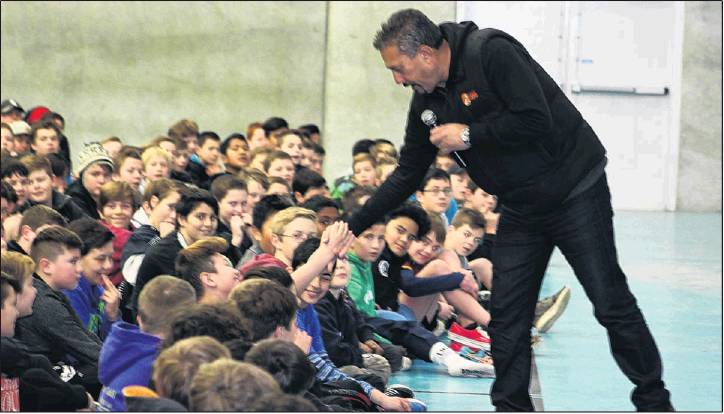New Zealand television/radio personality and former comedian Mike King sat down with Southland Express reporter PETRINA WRIGHT while he was in Invercargill last week to talk about his work raising awareness about mental illness. ‘Depression and suicide prevention are so dark and so horrible… someone needs to shine a light in this space.’
NOTE: Mike and his team must be invited by schools to speak, keep up to date with what Mike and his team are doing on their Facebook page

MIKE King is arguably best known as a comedian and television/radio personality, but that is certainly not how he wants to be identified. ‘‘Please don’t refer to me as a comedian. I haven’t been a comedian for 18 months. If you want to label me something [say] former comedian.’’ Mr King said he would never go back to doing comedy. ‘‘I never realised what a burden it was on my mental health until I quit.’’ Stand-up comedy was all about finding faults in life for people’s amusement, he said.
‘‘You become really bitter and cynical without even realising it… all under the guise of just a joke.’’ Mr King said he turned to comedy at school as a way to find acceptance from his peers and combat his low self-esteem. ‘‘I was an ugly child. Buck teeth, huge head… I always felt awkward about myself.’’ He was on the outer at school — alone, with his inner critic constantly beating him up. That was until he found out he was funny. ‘‘I remember making my first joke at school.

Reaching out: Mike King talks to Year 7-13 pupils at Southland Boys’ High School last week.
The laughter I got out of it was the first time I had ever had any positive affirmation in my life. I immediately associated people laughing at my jokes with people liking me, which was day one of my downfall because that was the day I started to get my self esteem from the approval of other people.’’ He has battled with depression and drug and alcohol addiction, which ultimately led to a suicide attempt. ‘‘I spent my whole life hiding my problems, like all Kiwis do, wearing a mask of happiness, and it nearly killed me.’’ The turning point was April 1, 2007, when he vowed to get clean and sort himself out.
And his secret to getting well? Talking about his problems with a counsellor and on his radio programme The Nutters Club, which first aired on Radio Live in 2009. When he first started talking about his problems on the radio he expected listeners to ring in and abuse him, but instead they rang in saying they related to his story, he said. ‘‘My sense of isolation was gone.’’ As founder of the community peer support group the Key to Life Charitable Trust, Mr King now travels around the country talking to secondary school pupils and community groups about his experience with mental illness. His aim is to empower others, particularly young people, to seek help with their problems. ‘‘Depression and suicide prevention are so dark and so horrible… someone needs to shine a light in this space.’’ He said the response had been ‘‘hugely positive’’, but he was not surprised at that, because his approach was different. ‘‘We don’t go into schools and tell kids what to do, we go into schools and show kids what to do. ‘‘Kids can recognise themselves in my journey. [For most of them] I am the first flawed adult in their life.’’
When asked about his thoughts on the debate about whether suicide and suicide prevention should be openly talked about, Mr King was adamant it needed to be discussed. ‘‘Of course we talk about it, but it is how we talk about it. You can talk about suicide prevention without talking about suicide.’’ When he first became involved in the mental health sector three and a half years ago, Mr King said he believed in talking about suicide out loud, but had since changed his view.
‘‘We never discuss means, never discuss anything that could lead to ‘he was found in a forest’. None of that is helpful.’’ His approach was positive empowerment, he said, encouraging young people to find solutions to their problems by making it okay for them to ask for help. ‘‘Everyone has problems — depression, anxiety, major issues — to some degree or another. Having problems won’t hurt you. It is part of being human. But no-one talks about them so we all think we are going through it by ourselves.
Holding on to problems and trying to battle through all by yourself in isolation, that’s the killer.’’ The Ministry of Health estimated 20% of young people would have some type of major depressive episode associated with suicidal thoughts before they left school, he said. It was estimated 80% of them never asked for help because they were worried about what people would think, and education was the way to change those perceptions. ‘‘My succession plan is every kid thinking it is a good idea to talk about problems before they become major problems.’’
Republished courtesy of southlandexpress.co.nz
NOTE: Mike and his team must be invited by schools to speak, keep up to date with what Mike and his team are doing on their Facebook page


